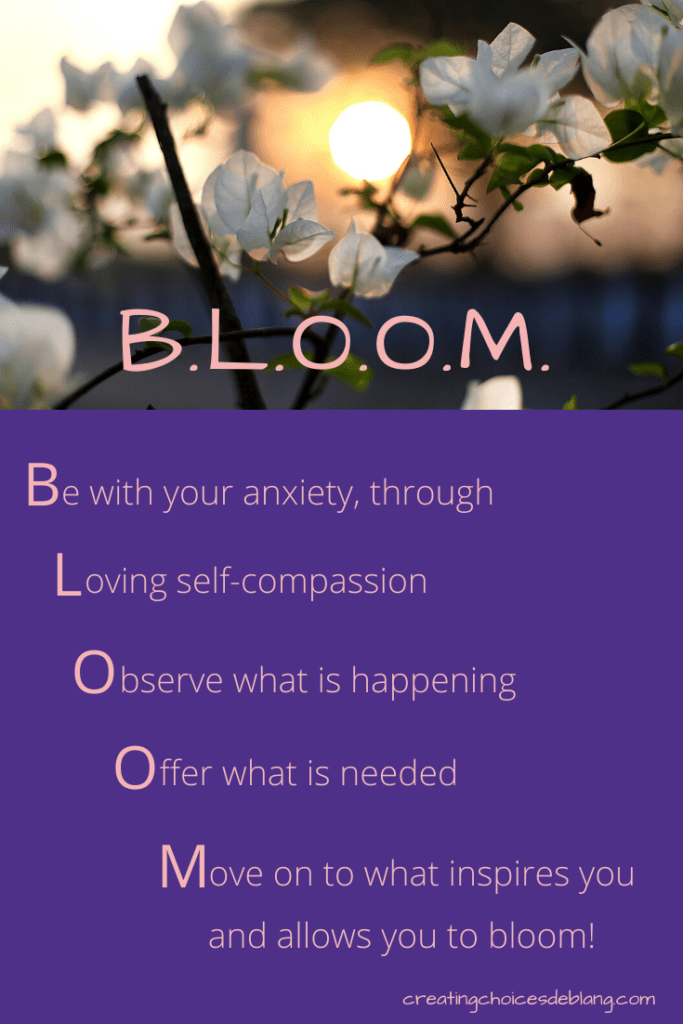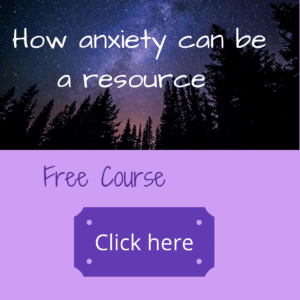
Would you like to get help for your anxiety and don’t really know how to do that?
Or, maybe, your health care provider has given you a referral and you are afraid to pick up the phone.
If so, you are not alone!
In this post, I hope to:
- dispel some fears about getting help for anxiety
- talk about some of the ways you might get help
- and share with you what you might expect in therapy
Fears about therapy
What comes up for you when you look at this image?

Is this the image that comes up for you when you think of therapy – and does it evoke fear?
There really have only been a few people who have come to see me, as a Psychologist/therapist, who haven’t expressed fear about the process.
Most new clients sit, anxiously, on the edge of the couch across from me worried about what will happen next.
And, yes I had a couch in my office.
It was an easy way to provide extra seating and some folks liked to stretch out – once they got comfortable.
In starting therapy, there have been fears about
- making the call
- what we would be doing in our sessions
- what I was going to “see” and
- really just the whole notion of “being in therapy” with whatever connotations that brought with it.
Can you relate to some of these fears?
what are your fears about getting help?
Are you too anxious even to contemplate it? or to pick up the phone?
If that is you, please keep reading as I am going to suggest an option which might help with that.
Do you worry that you will be judged or feel afraid that going to therapy means something negative about you?
Maybe that you are “weak” or that people will think you are “crazy?”
I think some of these notions are fading as more and more people are utilizing therapy and discovering the growth and change that is possible
And, I also know that taking the first step is often difficult.
but won’t I be judged?
When it comes to the fear of being judged, most clients very quickly realize that I am interested in:
- getting to know them
- in learning about the ways in which they are stuck
- in helping them to suffer less and have more joy, and,
- that I have no interest in judging because I know that all of us struggle, at one point or another.
therapists are humans, too
Clients also realize, as they get to know me, that I am human.
I make mistakes and I have my own struggles.
Sessions aren’t about me and I think my clients quickly realize that I don’t see myself as
being above them in any way
simply because of my education or skills.
My work is about helping people connect or reconnect with their internal strengths and wisdom.
It is not about judging whatever circumstances led them to my door.
conditions to look for in therapy
This image isn’t perfect and it does portray many of the conditions that are important in therapy or

that you might expect in a therapist.
Maybe with the exception of the caressing.
Although in this context I might take that to mean holding and caressing your concerns and fears.
You need to feel safe and accepted for therapy to be effective.
seeking help is a sign of strength
It is a sign of strength to seek help when you are struggling

not a sign that you are “crazy”, weak or
whatever negative term you may have believed about what it means to need “therapy”.
It takes courage to look at oneself and every person who has walked through my door or picked up the phone, has demonstrated their courage!
So, what happens in therapy for anxiety?
One of the first things that I do is to gather history.
I need to understand how anxiety is showing up in your life, when it started and especially if it is related to trauma.
There are many approaches to treating anxiety.
My belief is that to make a difference with anxiety, it is essential to work on skills or practice with techniques that specifically target your anxiety.
It is also essential that you understand what anxiety is
and where it comes from
so that you are not making it worse.
Learning this information often makes a huge difference.
Most people believe that there is something wrong with them, because they get anxious and
learning that this isn’t true is such a big relief!
Will I be in therapy forever?
Some people spend a few sessions turning their thinking around about anxiety and then they are out the door.
For others, having the information is helpful and we need to work on getting it in place in their lives.
Most often this involves learning a set of skills.
These skills set the stage, or make it feel safe, for doing any necessary emotional work around old trauma or past experiences or beliefs that are triggering anxiety.
When I was in training and doing my own skill building, a trainer once said to me,
“it takes as long as it takes”
I like to add to that,
“and, that’s okay”
People typically spend as little or as long in therapy as they want and need.
You are in charge and you get to make those decisions.
still unsure about therapy to help with your anxiety?
Do you still feel too anxious to consider starting therapy?
Or, maybe, you aren’t sure you need therapy and would like to, instead, learn some skills to deal with your anxiety.
Another option for beginning to work on your anxiety is to take an online class.
Online classes to help with anxiety
Now to be clear, classes are not a substitute for therapy.
And, taking a class is a good way to learn skills that can make a huge difference in dealing with your anxiety.
Currently, I have two online classes for anxiety.
In “How Anxiety can be a Resource”, I explain
- what causes anxiety and
- how the way most people approach anxiety only makes it worse
- and why it is so important to approach it in a different way.
This class is free.
Not because it isn’t valuable.
It is free because I feel passionate about sharing this information with as many people as possible to help with anxiety.
It is the same information that I share with my clients when they start working me.
I also offer a skill based class for those of you who want to take it further.
B.L.O.O.M. is a skill-based model designed to help you move from feeling anxious to feeling calm, confident and courageous.

This class sets you up to B.L.O.O.M. in ways that you haven’t been able to when your anxiety has been holding you back.
And, start with the free class.
Learn about anxiety and find out whether you have been approaching anxiety in a way that is making it worse for you.
Then, consider taking the skills class to really hone your skills.
This model can also be applied to most other areas in your life.
Online therapy
Online therapy can alleviate some of the anxiety related to starting therapy.
You don’t have to travel to an office, or worry about who might see you and you will be in the comfort and security of your home for your sessions.
It is also a helpful option, right now, with concerns about the virus.
If you would like to learn more about working with me, individually online, click here and we can talk about whether online therapy is a good option for you.
If you have found the information in this article useful, I’d love to hear it. And, if there are other topics you are interested in, be sure and let me know that as well. You can do that below in the comment section.
With warmth and kindness,
Deb

If you find it hard to be yourself in the world, need to keep others happy to feel okay about yourself, or get derailed by disapproval, check out my book Never Enough—Separating Self-Worth from Approval
If you enjoyed this article, be sure to signup below so that you will receive notification when articles are published. Want to share your thoughts or have a topic you are interested in learning about, scroll down to leave a comment.


0 Comments